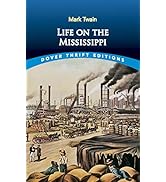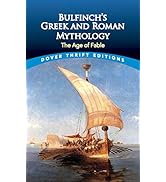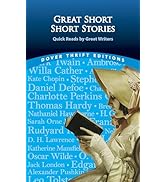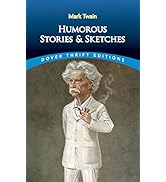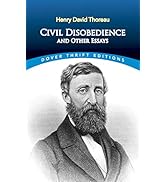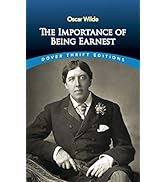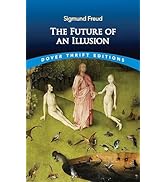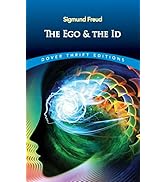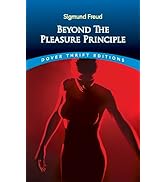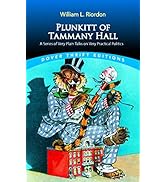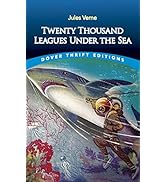| Print List Price: | $5.00 |
| Kindle Price: | $0.99 Save $4.01 (80%) |
| Sold by: | Amazon.com Services LLC |
Your Memberships & Subscriptions

Download the free Kindle app and start reading Kindle books instantly on your smartphone, tablet, or computer - no Kindle device required.
Read instantly on your browser with Kindle for Web.
Using your mobile phone camera - scan the code below and download the Kindle app.





Notes from the Underground (Dover Thrift Editions: Classic Novels) Kindle Edition
- LanguageEnglish
- PublisherDover Publications
- Publication dateMarch 5, 2012
- Reading age14 years and up
- File size590 KB
Customers who bought this item also bought
From the brand

-

Debuting in 1990, the Thrift Editions library of classic literature is a top choice for teachers, students, librarians, and recreational readers around the world. Dover’s longstanding mission of exceptional value has consistently offered excellence in classic fiction, nonfiction, plays, and poetry.
Dover Thrift Editions are low priced, compact (5"x8"), complete and unabridged.
-
-
Are there any collections of stories or poetry in the Dover Thrift Editions?
In addition to single title books, Dover offers books of anthologies in fiction, non-fiction and poetry. Check out our Thrift Editions of short stories, literary collections, poetry, gothic and horror, SciFi/Fantasy, crime/mystery/thrillers and more. Happy Reading!
What formats are the Thrift Editions available in?
All are available in an easy to carry paperback version and most titles are available for the Kindle e-reader.
-
-
-
-
-
-
-
-
-

-
-
-
-
-
-
-
From the Publisher


With his sympathetic portrayals of the downtrodden of 19th-century Russian society, Dostoyevsky (1821–1881) exercised immense influence on modern writers.
“I say let the world go to hell, but I should always have my tea.”
“To love is to suffer and there can be no love otherwise.”
“How can a man of consciousnesshave the slightest respect for himself”
In 1864, just prior to the years in which he wrote his greatest novels - Fyodor Dostoyevsky penned the darkly fascinating Notes from the Underground
Moreover, the novel introduces themes—moral, religious, political and social—that dominated Dostoyevsky's later works
A fascinating short novel depicting the struggles of a doubting, supremely alienated protagonist in a world of relative values. Seminal work introduced moral, religious, political and social themes that dominated Dostoyevsky's later masterworks.
- Constance Garnett's authoritative translation is reprinted here, with a new introduction.

Editorial Reviews
About the Author
Excerpt. © Reprinted by permission. All rights reserved.
Notes from the Underground
By Fyodor M. DostoevskyDover Publications
Copyright © 1992 Fyodor M. DostoevskyAll right reserved.
ISBN: 9780486270531
Chapter One
PART ONE
UNDERGROUND*
I
I AM a sick man. . . . I am a spiteful man. An unattractive man. I
think that my liver hurts. But actually, I don't know a damn thing
about my illness. I am not even sure what it is that hurts. I am not
in treatment and never have been, although I respect both medicine
and doctors. Besides, I am superstitious in the extreme; well, at
least to the extent of respecting medicine. (I am sufficiently
educated not to be superstitious, but I am.) No, sir, I refuse to see
a doctor simply out of spite. Now, that is something that you
probably will fail to understand. Well, I understand it. Naturally, I
will not be able to explain to you precisely whom I will injure in
this instance by my spite. I know perfectly well that I am certainly
not giving the doctors a "dirty deal" by not seeking treatment. I
know better than anyone that I will only harm myself by this, and no
one else. And yet, if I don't seek a cure, it is out of spite. My
liver hurts? Good, let it hurt still more!
I have been living like this for a long time-about twenty years. Now
I am forty. I used to be in the civil service; today I am not. I was
a mean official. I was rude, and found pleasure in it. After all, I
took no bribes, and so I had to recompense myself at least by this.
(A poor joke, but I will not cross it out. I wrote it, thinking it
would be extremely witty; but now I see that it was only a vile
little attempt at showing off, and just for that I'll let it stand!)
When petitioners came to my desk seeking information, I gnashed my
teeth at them, and gloated insatiably whenever I succeeded in
distressing them. I almost always succeeded. Most of them were timid
folk: naturally-petitioners. But there were also some fops, and among
these I particularly detested a certain officer. He absolutely
refused to submit and clattered revoltingly with his sword. I battled
him over that sword for a year and a half. And finally I got the best
of him. He stopped clattering. This, however, happened long ago, when
I was still a young man. But do you know, gentlemen, what was the
main thing about my spite? Why, the whole point, the vilest part of
it, was that I was constantly and shamefully aware, even at moments
of the most violent spleen, that I was not at all a spiteful, no, not
even an embittered, man. That I was merely frightening sparrows to no
purpose, diverting myself. I might be foaming at the mouth, but bring
me a doll, give me some tea, with a bit of sugar, and I'd most likely
calm down. Indeed, I would be deeply touched, my very heart would
melt, though later I'd surely gnash my teeth at myself and suffer
from insomnia for months. That's how it is with me.
I lied just now when I said that I had been a mean official. I lied
out of sheer spite. I was merely fooling around, both with the
petitioners and with the officer, but in reality I could never have
become malicious. I was aware at every moment of many, many
altogether contrary elements. I felt them swarming inside me, those
contrary elements. I knew that they had swarmed inside me all my
life, begging to be let out, but I never, never allowed them to come
out, just for spite. They tormented me to the point of shame, they
drove me to convulsions-I was so sick and tired of them in the end.
Sick and tired! But perhaps you think, dear sirs, that I am now
repenting of something before you, asking your forgiveness for
something? . . . Indeed, I am quite certain that you think so. But
then, I assure you it doesn't make the slightest difference to me if
you do. . . .
I could not become malicious. In fact, I could not become anything:
neither bad nor good, neither a scoundrel nor an honest man, neither
a hero nor an insect. And now I am eking out my days in my corner,
taunting myself with the bitter and entirely useless consolation that
an intelligent man cannot seriously become anything; that only a fool
can become something. Yes, sir, an intelligent nineteenth-century man
must be, is morally bound to be, an essentially characterless
creature; and a man of character, a man of action-an essentially
limited creature. This is my conviction at the age of forty. I am
forty now, and forty years-why, it is all of a lifetime, it is the
deepest old age. Living past forty is indecent, vulgar, immoral! Now
answer me, sincerely, honestly, who lives past forty? I'll tell you
who does: fools and scoundrels. I will say this right to the face of
all those venerable old men, all those silver-haired, sweet-smelling
old men! I have a right to say it, because I will live to sixty
myself. To seventy! To eighty! . . . Wait, let me catch my breath. .
. .
You might be imagining, gentlemen, that I am trying to amuse you, to
make you laugh? Wrong again. I am not at all the jolly character you
think I am, or may perhaps think I am. But then, if, irritated by all
this prattle (and I feel it already, I feel you are irritated),
you'll take it into your heads to ask me what I am, I'll answer you:
I am a certain collegiate assessor. I worked in order to eat (but
solely for that reason), and when a distant relation left me six
thousand rubles in his will last year, I immediately retired and
settled down in my corner. I had lived here previously as well, but
now I've settled down in this corner. My room is dismal, squalid, at
the very edge of town. My servant is a peasant woman, old, stupid,
vicious out of stupidity, and she always has a foul smell about her
besides.
I am told that the Petersburg climate is becoming bad for me, that
with my niggling means it's too expensive to live in Petersburg. I
know all that, I know it better than all those wise, experienced
counselors and head-shakers. But I stay on in Petersburg; I shall not
leave Petersburg! I shall not leave because. . . . Ah, but what
difference does it make whether I leave or don't leave.
To go on, however-what can a decent man talk about with the greatest pleasure?
Answer: about himself.
Well, then, I too shall talk about myself.
-
Continues...
Excerpted from Notes from the Undergroundby Fyodor M. Dostoevsky Copyright © 1992 by Fyodor M. Dostoevsky. Excerpted by permission.
All rights reserved. No part of this excerpt may be reproduced or reprinted without permission in writing from the publisher.
Excerpts are provided by Dial-A-Book Inc. solely for the personal use of visitors to this web site.
Product details
- ASIN : B00A3IKMNO
- Publisher : Dover Publications; Dover ed edition (March 5, 2012)
- Publication date : March 5, 2012
- Language : English
- File size : 590 KB
- Text-to-Speech : Enabled
- Screen Reader : Supported
- Enhanced typesetting : Enabled
- X-Ray : Enabled
- Word Wise : Enabled
- Sticky notes : On Kindle Scribe
- Print length : 99 pages
- Best Sellers Rank: #705,971 in Kindle Store (See Top 100 in Kindle Store)
- #1,512 in Two-Hour Teen & Young Adult Short Reads
- #2,102 in Classic Literary Fiction
- #5,822 in Two-Hour Literature & Fiction Short Reads
- Customer Reviews:
Customer reviews
Customer Reviews, including Product Star Ratings help customers to learn more about the product and decide whether it is the right product for them.
To calculate the overall star rating and percentage breakdown by star, we don’t use a simple average. Instead, our system considers things like how recent a review is and if the reviewer bought the item on Amazon. It also analyzed reviews to verify trustworthiness.
Learn more how customers reviews work on Amazon-
Top reviews
Top reviews from the United States
There was a problem filtering reviews right now. Please try again later.
Incredibly modern for its time: I could see how inspiring this book might have been to Kafka and to many important existentialist thinkers of the 20th century, such as Sartre and Camus.
I especially loved the first part: Dostoyevsky knows how to penetrate deep into the human soul (even though I don't believe in souls) and, in words, describes the human condition. He opens the eyes of his readers to a world where its darkness can blind one's sight forever, and still...You keep reading, even if you can't keep reading. This is not an easy read and yet, you can't escape from temptation.
There are books that change you, maybe because of a particular character, or even just a single sentence. The books you'd never forget; books that make up your nostalgia; they are a piece of your youth; something unforgettable. And then...there are books that not only touch their readers, but they become part of history; an important milestone; they change every writer who comes after them and change the whole path of literature. The irony is that most of their writers had no clue about the importance of their work!
Notes From Underground, for sure, is one of these books. Dostoyevsky, for sure, is one of those writers.
I would definitely recommend this book to any literature-obsessed-mind!
Top reviews from other countries
La prima parte mi è piaciuta di piu ,la seconda forse un po piu noiosetta , nel complesso bello.
Very well crafted. I recommend reading part 1, then part 2, and then part 1 again. Reading "Notes" this way will add to your initial impression as a reader the historical order and point of view of underground man himself and part 1 the second time around will have whole new layers of pertinence.
It starts with 40 pages of what can only be described as a psychological summary of the first person narrator: 'The Underground'. This section reads like a work of philosophy, and if you're familiar with philosophical works, then this will seem like comfortable ground. Except here there are traces of an unreliable voice. Through the pen of our narrator we are examining his own creation / destruction paradox and his penchant for a kind of cowardice - which he eloquently excuses by virtue of his being a higher being.
From here we are brought to the plot: 'Apropos of Wet Snow'. Suddenly we are cast on a timeline through a sequence of five vignettes - there are characters, dialogue and narrative, but this is most assuredly Dostoyevsky, and if you have read any of his other novels, you will be back on comfortable territory. The five vignettes work like the five acts of a play. Once again, Petersberg is vivid (if only sparingly described). Each vignette (or act) serves to show us the various traits of the principal character described in the first part.
The narrator (perhaps literature's most deluded autobiographer) seeks to atone for his flaws or to cast them on the world as a kind of punishment. He sees himself, he hates what he sees and punishes the world for it, thereby also punishing himself. He can't face what he sees in himself, and so hides behind a superiority complex which is really only the strength of tissue paper. The very worst thing for him is that he believes that he can't change.
At its heart this book is a complex psychological study. As is always the case with good characters, there is altogether too much of him to discuss in a review of any length, but the brilliance of Dostoyevsky makes him vivid and real so that we share in his humiliations and are frustrated by his frequent errors of judgement. We end up viewing him with a kind of anger proportionate with the hatred he feels for his remembered self.
This is a truly brilliant book.
Dan Crawford

























